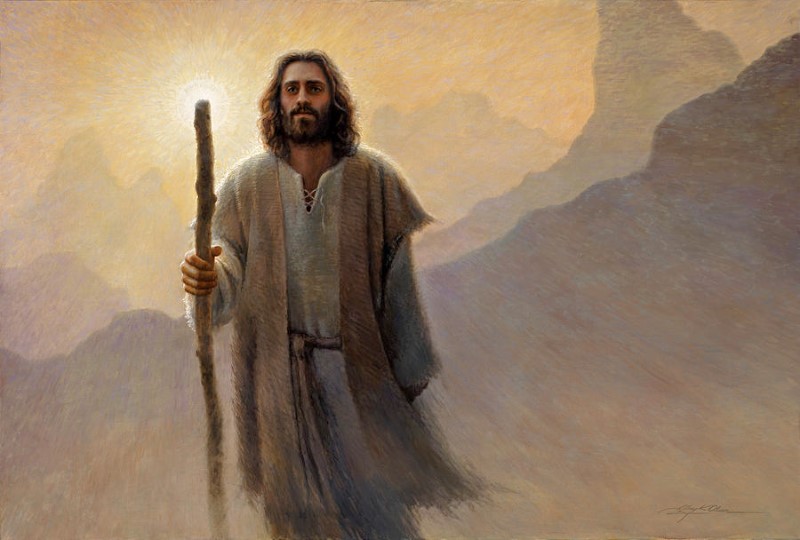In reading the gospels I am always struck by the elusiveness of Jesus Christ. It is extraordinary how realistic the portrait of Jesus is in the gospels. On the one hand he is incredibly complex, but then on another glance he is totally simple, straightforward and clear. You can’t figure him out, and then you realize he doesn’t need figuring out. He is what he is. Nothing false. He doesn’t play power games. He doesn’t manipulate. He’s not on an ego trip.
The scholars who have tried to write their biographies of Jesus have invariably failed because they have all tried to figure him out. They’ve tried to put him in a box, pin him down, give him an agenda, and turn him into some sort of campaigner or rebel with a cause. So they paint him as the religious revolutionary or the wise rabbi. They portray him as a country apocalyptic preacher, a healer and a Jewish guru. They cast him as a proto communist, a liberator or a Brother Sun, Sister Moon hippie.
Their portraits always reveal their own agenda, not his. The biographies reveal their own hang ups, not his. Their books reveal their own obsessions, not his. Their books are self portraits, not portraits of Jesus Christ.
More than any other man, he defies their categories, their agendas, their ideologies and their man made theologies.
All around him the busy busy people were gathering into tribes, fomenting their cause, quarreling with one another and among themselves. All around him they formed their pressure groups and campaigned not so much for their truth as against everyone else’s. To prove the other side wrong was the way to make their case.
So the Zealots sharpened their knives and planned to overthrow the Romans to achieve freedom. Would he join their cause? No, but one of them became a disciple. The Pharisees gathered in their holy huddle. They had the truth! They observed all the legalities! They observed correct worship! The tassels on their prayer shawls were the correct length! They did not mix with publicans and prostitutes! Did he join them? No, but one of them came by night to seek his mercy. The Sadducees gathered in their tribe. They were the ruling class. They had the money. They had the power. They had the influence. They were steering a steady course to preserve the status quo. They knew the job they had to do. Did he join them? No. Then there were the Essenes–the spiritual masters, the monks and the mystics of their day. They had their zealous religious communities, their celibacy and their ritual washings. They had their apocalyptic writings, their esoteric teachers and their lofty way of life. He didn’t join them. Then there were the Samaritans with their ancient sect, the Galileans, Judeans, Jews of the diaspora…
The list could go on….the Herodians with their political alliance, the Romans with their dominant ways, and there were other political and ethnic and economic tribes…the Egyptians to the South, the Parthians to the North, the Nabateans to the East…
He belonged to none of them because he fulfilled all of them. All their dreams and aspirations, all their ideologies and agendas were abolished by being fulfilled by him if only they could see it.
As a result, regard the elusive loneliness of Christ.
The most moving and compelling vignette…the one that reveals him in all his divine simplicity is the detail repeated quietly throughout the gospel–almost as an aside–that he went to the mountains alone to pray all night.
That is the heart of Jesus Christ. If you want to know him, seek him there…not first in his healing and preaching, nor in the fury of his cleansing the temple, his kindness to the sinner and his miracles and mercy. These are all the result of his solitude. They are the outworking of his intimate union with the Father.
What is the meaning of this? I see that we are still doing what they did when he was here. We are busy forming our zealous little tribes with our ideologies and agendas. We are busy quarreling amongst ourselves over who will be greatest in the kingdom. We are busy proving ourselves correct by proving everyone else to be wrong. We swallow stupid political solutions–aligning ourselves with a political party, a candidate or an ideology thinking that will solve the world’s problems. We too get into our holy huddles to argue about the legalities or the liturgy, the theology or the methodology or the psychology or just about any “ology” we can think to waste time on.
And he walks by on the waves of our turmoil and turbulence. In that dark night on the Sea of Galilee do you remember that strange and disconcerting detail? He came to them walking on the water, but it was as if he was going to pass by them. They were all caught up in their big stormy moment. He calmed the waves because he himself was calm. He was going to walk on by. He was headed somewhere else almost as if he were oblivious to their concerns. His mind was elsewhere.
His heart was elsewhere. His home was elsewhere.
He belonged to another country.







You wrote: “The scholars who have tried to write their biographies of Jesus have invariably failed because they have ALL tried to figure him out. They’ve tried to put him in a box, pin him down, give him an agenda, and turn him into some sort of campaigner or rebel with a cause.” Brother Sun, Sister Moon, proto communist?
I just do not see this assessment as fitting to “The Life of Christ” by Fulton Sheen or to “Jesus of Nazareth” by Pope Benedict XVI. I am sure there must be a half dozen more scholars who did not fail to present a biography that truly helps us to understand Christ better. Is it not the Church’s mission to teach us about Christ?
I also accept that no one can ever present a COMPLETE biography of the Living Son of God. None of us can know the complete God. But a necessarily incomplete bio is not a failure per se. Otherwise every bio of Washington, Lincoln, Churchill, etc. are failures and not worth our effort to read. At least while we are in this life. But I am grateful for the more respected biographies of Christ from authors such as Bishop Sheen and Pope Benedict XVI
And thank you for expanding my knowledge of the various leadership groups in Christ’s time on earth, how they would not or could not understand Him. And how the shortsighted petty arguments of that time seem to persist throughout time, especially in our current time. In and outside the Catholic Church.
So, your implied counsel – focus on Christ as presented in the Gospels – should help us navigate through the misguided arguments of today. We must remember Christ is God. We are not.
Thanks for your observation about Sheen and B16s work. Of course not all scholars miss the mark. You’ve identified two who did not. Thanks. Thanks too for getting the main point! It’s about Jesus. Not our agendas.
You are welcome, Father. I enjoy reading your essays, They help me understand better. Keep up the good work. We need it.